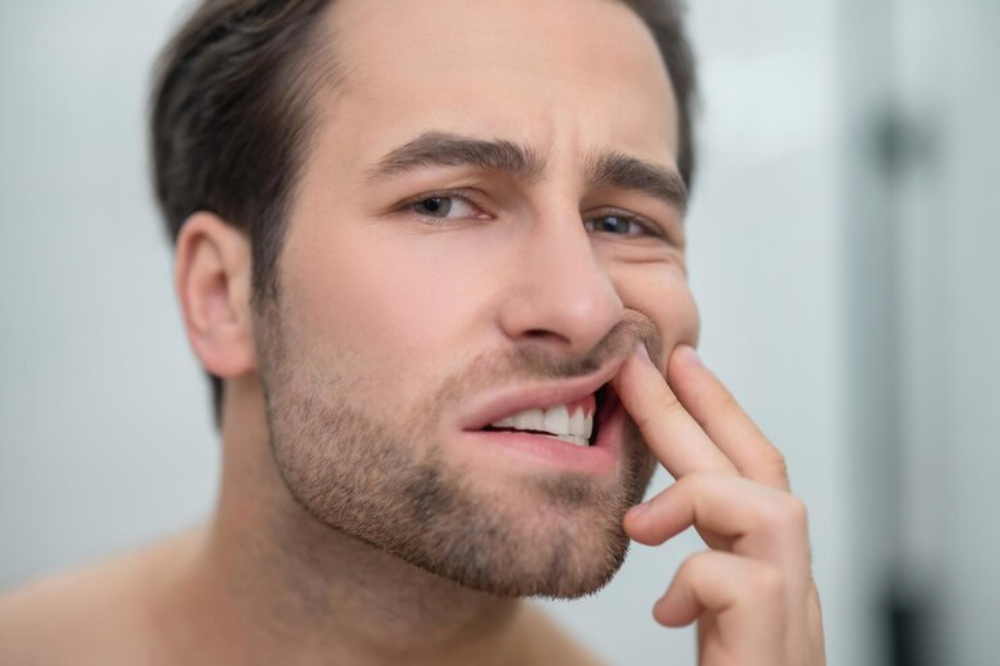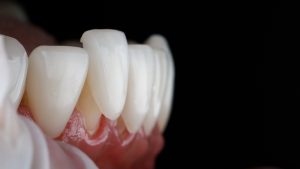For the most part, tingling gums and teeth is no cause of any specific concern. Still, in some cases, they may signal more serious dental issues such as tooth enamel loss, pulpitis, bruxism, and more.
This article will aim at covering all the problems related to tingling teeth and will give you guidance in determining whether you should consider seeing a dental therapist who may be able to help you with your issues. For example, these experts can help you create custom mouth guards for grinding teeth.
However, we don’t want to jump the gun. See the most common causes of tingling gums and teeth below.
Why Are My Teeth Tingling: Possible Causes
Tingling teeth and gums may give uncomfortable shivers up your spine out of the blue. In some cases, these problems will need proper treatment, while in others, they won’t.
Let’s check them out and talk about prevention and possible treatment strategies.
Cavities
When your teeth are tingling, it can be a sign of a cavity that needs to be dealt with. Bacteria can cause tooth decay, leading to the formation of white or brown spots on your teeth which may turn into holes on the surface, penetrating down to the nerves and causing teeth tingling in the process.
At such advanced stages, cavities need to be addressed by a dentist to save the tooth and eliminate the tingling and pain.
Sensitive Teeth
Dentin hypersensitivity can cause pain as it makes your teeth overly sensitive to specific stimulations.
In some cases, it can cause teeth tingling and pain when you eat or drink something too hot or cold. In other cases, the teeth tingling may be triggered by biting down too hard on something,
For the most part, tooth enamel loss is the culprit behind tooth sensitivity. Your enamel can get damaged when you brush too hard, have problems with acid reflux, or suffer from certain eating disorders like bulimia.
On the other hand, your enamel may also wear off due to the natural aging process.
Other causes that may cause the tooth enamel to wear off:
- Genetics
- A diet high in sugars
- Medications like aspirin and antihistamines
- Gastrointestinal problems
The best way to fight tooth enamel loss is by implementing effective preventive strategies. On the other hand, you can always use mouthwash or special toothpaste to make your teeth less sensitive.
Burning Mouth Syndrome
Teeth tingling and tingling gums may also be caused by burning mouth syndrome, which is usually a sign of other medical problems such as acid reflux or allergies. In some cases, the syndrome may appear without the presence of any underlying problem.
Treatment options for burning mouth syndrome may include using medications and limiting the intake of foods that trigger the problem (like spicy and acidic foods).
Sometimes, experts will even recommend changing toothpaste as well as methods of reducing your stress levels.
Broken or Cracked Teeth
When you crack a tooth, the nerve in it can get exposed. Sometimes, the damage isn’t evident, so tingling gums and teeth might be the only thing you feel.
Cracked and/or broken teeth need to be repaired by a trained dental expert who will be the most knowledgeable to take the best course of action. They can fix the broken tooth with either a crown, dental implant, or bonding.
If the damage is too severe, they might resort to tooth extraction.
Pulpitis
The pulp is the fleshy area inside each tooth containing nerve endings and blood vessels. This area can get inflamed due to a bacterial infection in a tooth. This is what dentists refer to as pulpitis. Oftentimes, the patient suffering will experience pain with pulpitis, but tingling gums and teeth in the inflammation area are also common.
In some instances, pulpitis can be resolved by filling the cavity of the infected tooth to protect the tooth. In other cases, a root canal is the only option that removes the pulp.
Teeth Grinding
Apart from tooth enamel loss, pulpitis, and cavities, bruxism or teeth grinding may also cause tingling gums and tingling teeth.
Teeth grinding can increase tooth sensitivity and damage the jaw bone. Most of the time, bruxism is a result of anxiety and stress. Excessive drinking, smoking, high caffeine intake, depression, and sleep apnea may also lead to bruxism, but it can be caused by certain types of medication too.
Bruxism may be treated in several ways, and most of these will stop teeth tingling. For example, your dental professional may recommend wearing a custom mouthguard or different muscle relaxation techniques, along with different breathing methods to ease the anxiety and the grinding.
Gum Recession
Teeth tingling may also happen due to receding gums. When the gum tissue pulls away from your teeth, it creates small gaps between the gumline and teeth. After this, bacteria can easily fill the gaps leading to pain and sensitivity. Vigorous toothbrushing, poor dental habits, and genetics may all lead to this condition.
For some people, gum recession will be a problem even if they take care of their teeth as necessary. Some experts say that around 30% of the population has a predisposition to gum disease, no matter how well their dental hygiene is.
Even when your gums heal, the receding lines won’t grow back. But with gum graft procedures, patients can reverse the damages of the condition. Pinhole surgery may also be an effective method for correcting receding gum lines.
Still, prevention should be the top priority. Visiting a dental expert regularly for cleaning may delay gum recession and its effects. Dental hygienists can also help with tartar and plaque removal, while regular flossing will prevent the return of the bacteria.
Trigeminal Neuralgia
When they suffer from trigeminal neuralgia, patients may feel intense pain or tingling teeth and gums when they brush their teeth or shut their jaw. The pain will usually concentrate on one side of the face, and other actions, like drinking and eating, may also trigger the pain. This condition has a negative effect on the sides of the patient’s face.
Antiseizure medications may often prove successful in treating the conditions. These compounds block the nerve signals to the brain. If they fail to work, surgery may prove to be more successful.
Tingling Teeth Prevention
For the most part, good oral habits are the best way to prevent these problems from happening.
As such:
- Make sure to use a good toothbrush with bristles on the softer side
- Limit the consumption of acidic foods to preserve tooth enamel
- Wear mouthguards when engaged in contact sports
- Brush your teeth twice a day and floss daily
- Try to limit stress and anxiety to fight bruxism
- Visit your dentist regularly for cleanings and checkups.
Seeing a Dentist
As said in the beginning, tingling teeth might not be something you should worry about. However, if the sensations are persistent and accompanied by pain and other bothering symptoms, your best option is to schedule an appointment with your dentist as soon as possible.
Sometimes, tingling teeth point to more complex dental issues like enamel loss, decay, and gum disease, which all need to be addressed by a professional.
The tingling sensations in your mouth shouldn’t be ignored. If you have any questions or concerns, feel free to reach out to our experts for a consultation and checkup.










